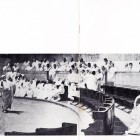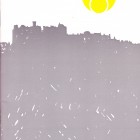Zauberflöte 1974Scottish Opera
Read more about the opera Magic Flute
David Pountney's delightfully fresh midi-scale staging of Magic Flute toured extensively from its Glasgow opening at the beginning of February before joining the early spring repertoire, though not initially scheduled for the big tour to Edinburgh, Aberdeen and Newcastle. The overall success of the enterprise ensured that it had a far longer life than anticipated, eventually totalling 66 performances and reappearing in 1977 after the reopening of the Glasgow Theatre Royal. The whole design was small in scale, with props being pushed on and off quickly as required.
For the now established summer week at the Lyceum, and the autumn tour, some cast changes were introduced. During 1974 it received a total of 37 performances. Particular awards for endurance should perhaps go to Gordon Sandison and Claire Livingstone who both appeared in all of them, as Papageno and Third Lady, respectively. Patricia Hay sang Pamina throughout the spring tour, and Alexandra Gordon also did a marathon stint as Queen of Night. Audiences in these theatres were lucky to see such notable stars as Clifford Grant and Robert Lloyd alternating as Sarastro. In the spring tour John Robertson and Frederick Donaldson sang Tamino on alternate nights, and when they weren't singing the prince they doubled First Priest and Armed Man.
After the Edinburgh Festival Alceste, with its brief excursion to Aldeburgh, Scottish Opera's autumn tour in 1974 centred on the first revival of the 1971 Der Rosenkavalier using the Scottish National Orchestra, and being sung this time in German. The Scottish Chamber Orchestra played in further performances of Elegy for Young Lovers and The Magic Flute. With the addition of some more players the SCO became the Scottish Philharmonia, who were in the pit for the new production, Lucia di Lammermoor. The tour took in Glasgow, Leeds, Newcastle and Aberdeen. In October, a strongly cast revival of The Barber of Seville was taken to Stirling and Ayr. Then in December the company played in Edinburgh, when Rosenkavalier and Lucia were supplemented by a revival of La bohème, not seen since 1967.
In the summer and autumn revival, two Americans made their debuts with the company, Lawrence Foster as conductor and John Macurdy, a leading bass at the Metropolitan, as Sarastro - with the Watergate scandal in the news, the resemblance of his speaking voice to that of Richard Nixon produced an ambivalence not entirely desirable - but his singing was, of course, excellent. Margaret Neville, an English soprano once a stalwart of Sadler's Wells but now working in Cologne, returned as an excellent Pamina. Catherine Gayer's main role during this visit was as the madwoman Hilda Mack in the revival of Elegy for Young Lovers, but she was highly effective as the Queen of Night, even if her wonderfully accurate coloratura was light and fluttery rather than fierily dramatic.
Ryland Davies, who had not sung in Scotland since his Ferrando in 1967, came in as a wonderfully lyrical Tamino, also good with his dialogue. At the performance at the Edinburgh Lyceum on 3 August he improvised well when there was an unexplained orchestral malfunction. As he was about to charm the attractive cut-out animals he put the flute to his lips and blew, to be met with silence. He tried again, with the same result, and just had time to say ''There seems to be something wrong with my flute today'' before, like magic, the instrument recovered. In what could have been an embarrassing incident, his physical control over the audience was masterly.
Scottish Opera's Spring season
Scottish Opera's spring 1974 season opened on 16 March with a single performance at Stirling's MacRobert Centre. This was the World Premiere of a new commission from Iain Hamilton, The Catiline Conspiracy. When the company moved on to its first visit to York, Catiline was joined by the previous season's Merry Widow and the recent compact staging of The Magic Flute. At Sunderland a revival of the 1970 Traviata joined the programme and the ensemble then moved on to Oxford. The Flute was then the only work seen in Perth before the main season opened in Glasgow. In that city, Newcastle, Edinburgh and Aberdeen, the repertoire of Catiline, Merry Widow and Traviata, all of which used the Scottish Chamber Orchestra or its expanded version, the Scottish Philharmonia, was augmented by the two operas that required the services of the SNO - revivals of the 1965 Boris Godunov and 1970 Fidelio.
Performance Cast
- Tamino a Prince
-
John Robertson (Mar; Apr 12, 13; Aug 1; Sep 14)
Frederick Donaldson (Apr 1, 11)
Ryland Davies (From Jul, exc Aug 1; Sep 14)
- First Lady in attendance on the Queen
- Second Lady in attendance on the Queen
- Third Lady in attendance on the Queen
- Papageno a bird-catcher
- Queen of Night
-
Alexandra Gordon (Exc Jul 31; Sep 13, 17; Oct 9)
Catherine Gayer (Jul 31; Sep 13, 17; Oct 9)
- Monostatos a servant in the Temple
-
David Fieldsend (Mar; Apr)
Graham Allum (Jul; Aug; Sep; Oct)
- Pamina daughter of the Queen of Night
-
Patricia Hay (Mar; Apr)
Margaret Neville Jul; Aug; Sep; Oct)
- First Boy
- Second Boy
- Third Boy
- Speaker at the Temple
- Sarastro High Priest of Isis and Osiris
-
Clifford Grant (Mar 22, 23, 26; Apr 1; Sep)
Robert Lloyd (Apr 11, 12, 13)
John Macurdy (Jul; Aug; Oct)
- First Priest
-
Frederick Donaldson (Exc Apr 1, 11)
John Robertson (Apr 1, 11)
- Second Priest
- Papagena disguised as an old woman
- First Armed Man
-
Frederick Donaldson (Exc Apr 1, 11)
John Robertson (Apr 1, 11)
- Second Armed Man
Production Cast
Performance DatesZauberflöte 1974
Theatre Royal, York | York
22 Mar, 19.30 23 Mar, 19.30
Empire Theatre, Sunderland | Sunderland
26 Mar, 19.30
New Theatre | Oxford
1 Apr, 19.30
Perth Theatre | Perth
11 Apr, 19.30 12 Apr, 19.30 13 Apr, 19.30
Royal Lyceum Theatre | Edinburgh
31 Jul, 19.30 1 Aug, 19.30 3 Aug, 19.30
King's Theatre, Glasgow | Glasgow
13 Sep, 19.15 14 Sep, 19.15
Grand Theatre, Leeds | Leeds
17 Sep, 19.15 21 Sep, 19.15
Theatre Royal, Newcastle | Newcastle-upon-Tyne
1 Oct, 19.15 5 Oct, 19.15
His Majesty's Theatre, Aberdeen | Aberdeen
9 Oct, 19.15 12 Oct, 19.15


